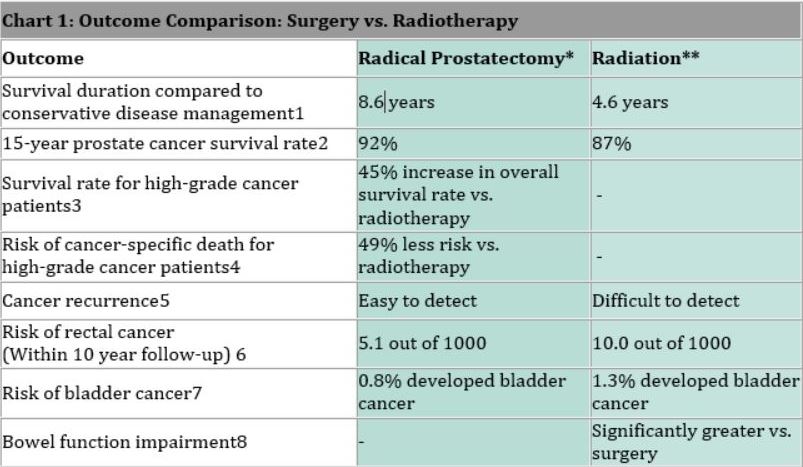The 45-Second Trick For Best Prostate Surgeon In Mumbai
Wiki Article
Newest Study on Prostate Cancer Cells Detection and Therapy Options
Current improvements in the field of prostate cancer discovery and therapy have actually triggered substantial rate of interest among medical professionals and patients alike. From innovative early detection techniques that hold guarantee for boosted results to the growth of genetic screening modern technologies that offer customized insights, the landscape of prostate cancer cells administration is swiftly progressing. Additionally, the emergence of unique immunotherapy approaches and the application of accuracy medication methods are improving the way we approach this condition. As researchers continue to explore these innovative modalities and their ramifications for patient treatment, the opportunities for more reliable and customized treatments in prostate cancer are becoming increasingly obvious.Very Early Discovery Approaches
Using advanced screening strategies is vital in the very early discovery of prostate cancer, as timely diagnosis substantially improves therapy end results (Best prostate cancer doctor in Mumbai). Raised levels of PSA may suggest the visibility of prostate cancer cells, prompting additional diagnostic examinations such as an electronic anal test (DRE) or a prostate biopsy.Recently, improvements in imaging innovation have resulted in the growth of even more accurate analysis tools for detecting prostate cancer cells. Multiparametric magnetic resonance imaging (mpMRI) is one such device that incorporates various sorts of MRI series to produce in-depth images of the prostate gland. This imaging technique helps in determining questionable locations that might require further examination via targeted biopsies. By incorporating these innovative testing methods into regular prostate cancer cells testings, health care carriers can enhance the possibilities of spotting the disease in its onset when therapy is most effective.

Hereditary Examining Advancements
Offered the advancements in diagnostic devices for finding prostate cancer cells, the combination of genetic testing advancements offers an appealing opportunity for more boosting very early detection methods. Hereditary screening has the potential to recognize individuals with a greater genetic proneness to prostate cancer, permitting targeted testing and individualized therapy plans. By examining particular hereditary pens related to prostate cancer cells, health care suppliers can better assess an individual's threat account and tailor screening procedures as necessary.Moreover, genetic testing advancements can help in establishing the aggression of prostate cancer, leading therapy decisions and enhancing patient results. Identifying anomalies in genetics like BRCA1 and BRCA2 can influence treatment choices, such as deciding for much more aggressive therapies or participating in scientific tests for targeted therapies.

Immunotherapy Advancements
What substantial development has been made in the realm of immunotherapy for prostate cancer therapy? Immunotherapy has actually arised as a promising therapy choice for prostate cancer, with recent developments showing fantastic possible in improving client outcomes.Another interesting location of research study is the growth of therapeutic cancer injections that promote the immune system to target prostate cancer cells particularly. These innovations in immunotherapy hold great pledge for enhancing outcomes for prostate cancer patients and are paving the means for even more personalized and efficient therapy techniques.
Precision Medicine Approaches
Immunotherapy innovations have actually led the method for accuracy medicine approaches in prostate cancer treatment, targeting details genetic changes to tailor therapies for private people. Accuracy medicine Resources in prostate cancer includes recognizing vital hereditary mutations or modifications within a patient's growth that drive cancer growth.
With accuracy medication, clients can benefit from therapies that are not just a lot more effective yet likewise potentially much less poisonous, as they are designed to particularly target cancer cells while saving healthy cells. In addition, continuous study is concentrated on recognizing new hereditary markers and establishing innovative targeted treatments to additionally improve the precision and efficacy of prostate cancer cells therapies. The assimilation of accuracy medication into clinical method represents a considerable advancement in the administration of prostate cancer, supplying hope for enhanced results and lifestyle for clients.
Emerging Treatment Methods

Verdict
To conclude, the latest study on prostate cancer cells detection and therapy alternatives has actually shown substantial developments in early detection techniques, hereditary testing developments, immunotherapy methods, accuracy medication strategies, and arising treatment methods. These developments hold assurance for enhancing client results and high quality of life. Best prostate cancer doctor in Mumbai. Proceeded research and cooperation in this field are necessary to additionally improve our understanding of prostate cancer and develop more reliable therapy go to this site strategiesRaised levels of PSA may suggest the visibility of prostate cancer cells, prompting more analysis examinations such as an electronic anal examination (DRE) or a prostate biopsy.An additional exciting location of research is the growth of therapeutic cancer vaccines that boost the immune system to target prostate cancer cells particularly.Immunotherapy developments have actually led the means for accuracy medication techniques in prostate cancer cells treatment, targeting particular hereditary modifications to tailor therapies for specific clients. Precision medicine in prostate cancer involves identifying vital hereditary mutations or changes within an individual's growth that drive cancer growth.In final thought, the most current research on prostate cancer cells detection and treatment options has shown substantial innovations in early detection approaches, genetic testing advancements, immunotherapy strategies, accuracy medicine methods, and emerging treatment modalities.
Report this wiki page